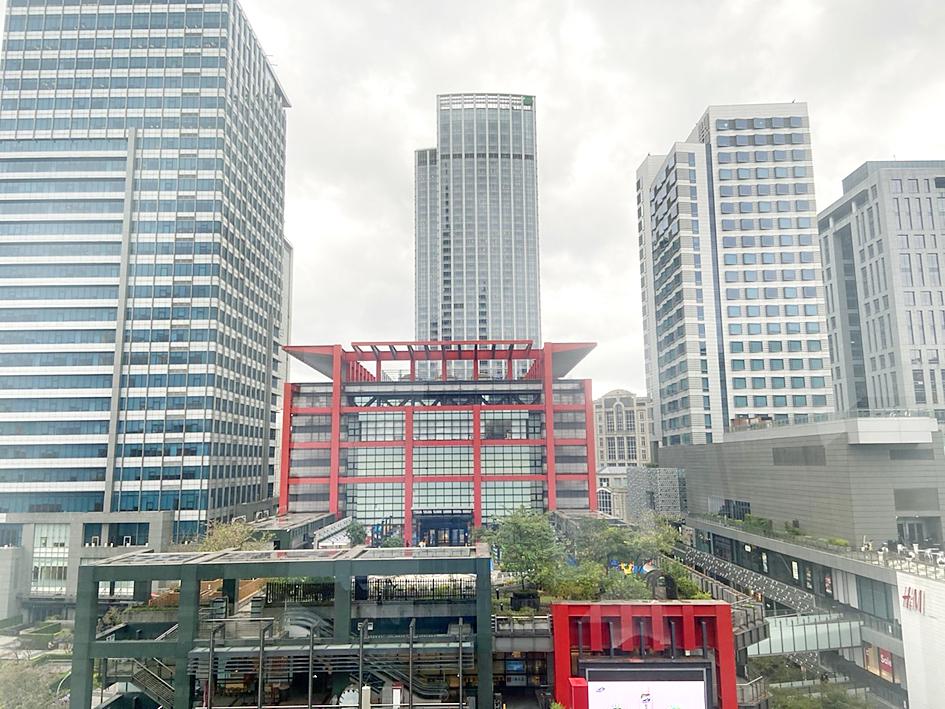The leasing market for Taipei’s upscale offices was resilient last quarter, as the monthly average rent gained 0.7 percentage points to NT$2,847 (US$101.13) per ping (3.3m2), although the vacancy rate climbed slightly to 2.4 percent, the local branch of Jones Lang LaSalle Inc (JLL) said yesterday.
The minor increase in vacancy resulted from landlords squeezing extra spaces to meet market needs amid a lack of fresh supply in central locations, JLL senior market director Brian Liu (劉建宇) told an online news conference.
The vacancy rate remained ultralow at 2.4 percent last quarter — albeit slightly up from 1.9 percent in the second quarter — which is why landlords increased rents upon renewing contracts, Liu said.

Photo: Hsu Yi-ping, Taipei Times
“Landlords had the upper hand in negotiations,” he said.
JLL Taiwan, which controls 60 percent of the local market, said that the average monthly rent for Grade-A offices could rise to a record NT$3,000 per ping next year, supported by stable demand from technology, financial and Internet businesses.
Supply, on the other hand, would stay tight, it said.
The supply crunch has prompted JLL Taiwan to focus its attention on the pre-leasing market these days, a trend that is likely to persist until massive supply enters the market in 2025, JLL managing director Tony Chao (趙正義) said, adding that a vacancy rate of 5 to 8 percent is considered the norm.
Relocation and upgrade needs would add further momentum to the market, as 49 percent of top-grade offices in Taipei turn 20 years or older, Chao said.
The process of digitalization and the COVID-19 pandemic are reshaping the concept of ideal and efficient office spaces and layouts, he said.
The average office rent in the city’s prime Xinyi District (信義) picked up 0.4 percentage points quarterly to NT$3,435 per ping, diverging increasingly from rates in other popular locations, the broker said.
Rental rates for landmark buildings way exceeded the benchmark, Chao said, referring to newly completed and upcoming office spaces.
Vacancy rates in Nangang District (南港) dwindled to 0.8 percent, while rents held steady at NT$1,400 to NT$2,500 per ping, JLL Taiwan said.
Vacancy figures stood little changed in western Neihu District (內湖) at 4.82 percent, with rental fees averaging NT$1,300 to NT$2,000 per ping, its quarterly report said.
Honhui Ruiguang Plaza (宏匯瑞光), a mixed-use complex on Neihu’s bustling Ruiguang Road, is approaching full occupancy, JLL Taiwan said.
The economy at home and abroad is emerging from the pains of the COVID-19 pandemic, which is favorable to the market, despite lingering uncertainty, it said.

Semiconductor shares in China surged yesterday after Reuters reported the US had ordered chipmaking giant Taiwan Semiconductor Manufacturing Co (TSMC, 台積電) to halt shipments of advanced chips to Chinese customers, which investors believe could accelerate Beijing’s self-reliance efforts. TSMC yesterday started to suspend shipments of certain sophisticated chips to some Chinese clients after receiving a letter from the US Department of Commerce imposing export restrictions on those products, Reuters reported on Sunday, citing an unnamed source. The US imposed export restrictions on TSMC’s 7-nanometer or more advanced designs, Reuters reported. Investors figured that would encourage authorities to support China’s industry and bought shares

TECH WAR CONTINUES: The suspension of TSMC AI chips and GPUs would be a heavy blow to China’s chip designers and would affect its competitive edge Taiwan Semiconductor Manufacturing Co (TSMC, 台積電), the world’s biggest contract chipmaker, is reportedly to halt supply of artificial intelligence (AI) chips and graphics processing units (GPUs) made on 7-nanometer or more advanced process technologies from next week in order to comply with US Department of Commerce rules. TSMC has sent e-mails to its Chinese AI customers, informing them about the suspension starting on Monday, Chinese online news outlet Ijiwei.com (愛集微) reported yesterday. The US Department of Commerce has not formally unveiled further semiconductor measures against China yet. “TSMC does not comment on market rumors. TSMC is a law-abiding company and we are

FLEXIBLE: Taiwan can develop its own ground station equipment, and has highly competitive manufacturers and suppliers with diversified production, the MOEA said The Ministry of Economic Affairs (MOEA) yesterday disputed reports that suppliers to US-based Space Exploration Technologies Corp (SpaceX) had been asked to move production out of Taiwan. Reuters had reported on Tuesday last week that Elon Musk-owned SpaceX had asked their manufacturers to produce outside of Taiwan given geopolitical risks and that at least one Taiwanese supplier had been pushed to relocate production to Vietnam. SpaceX’s requests place a renewed focus on the contentious relationship Musk has had with Taiwan, especially after he said last year that Taiwan is an “integral part” of China, sparking sharp criticism from Taiwanese authorities. The ministry said

US President Joe Biden’s administration is racing to complete CHIPS and Science Act agreements with companies such as Intel Corp and Samsung Electronics Co, aiming to shore up one of its signature initiatives before US president-elect Donald Trump enters the White House. The US Department of Commerce has allocated more than 90 percent of the US$39 billion in grants under the act, a landmark law enacted in 2022 designed to rebuild the domestic chip industry. However, the agency has only announced one binding agreement so far. The next two months would prove critical for more than 20 companies still in the process